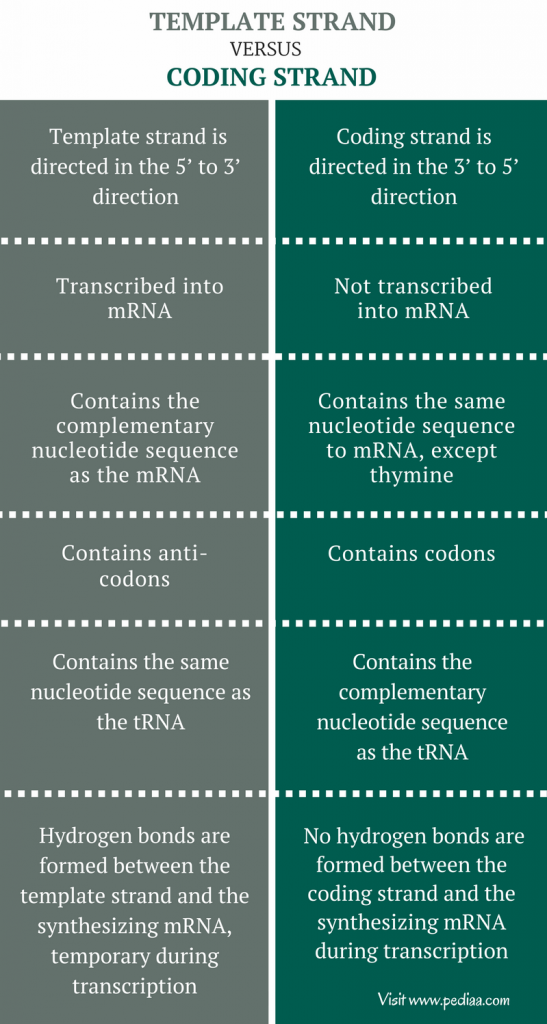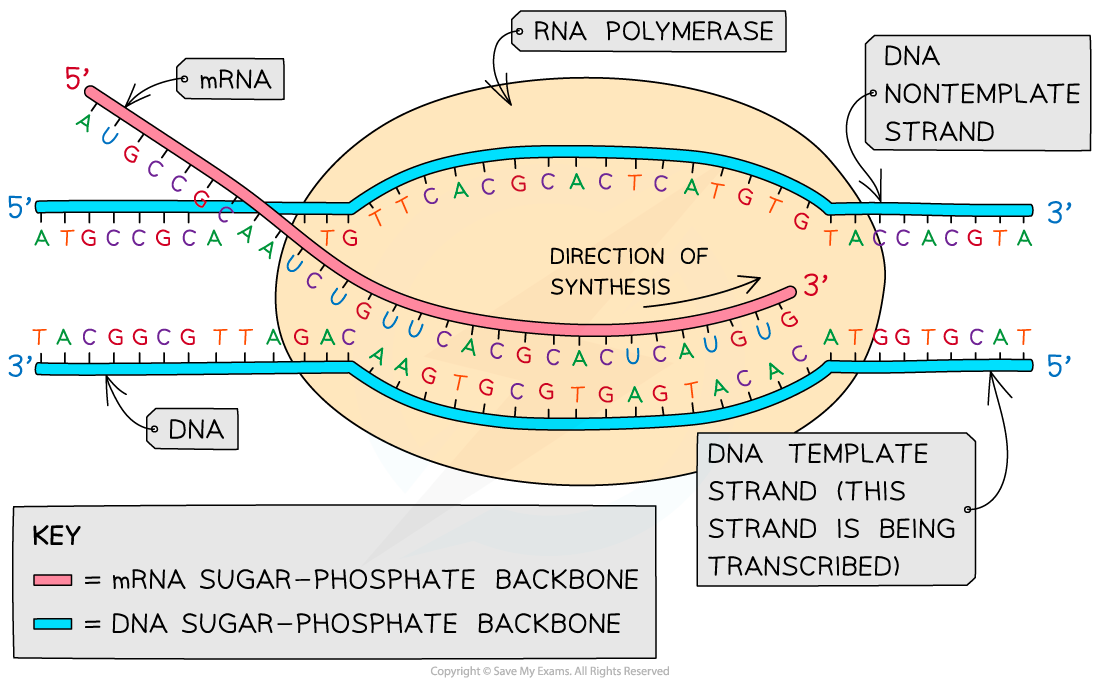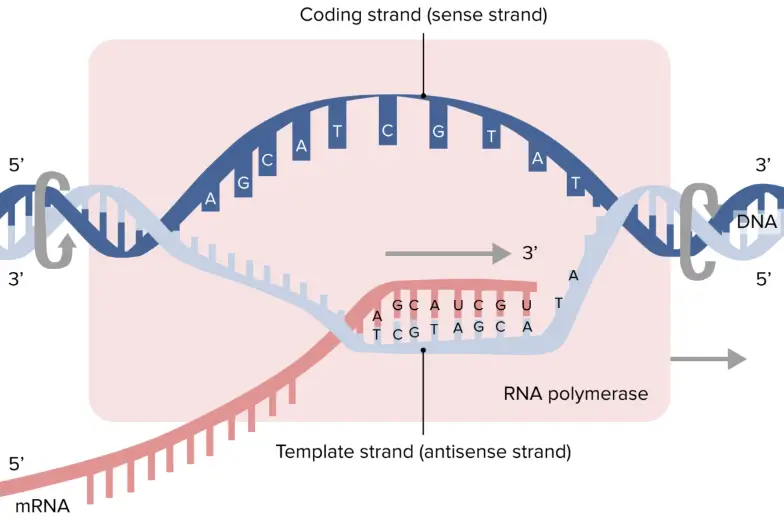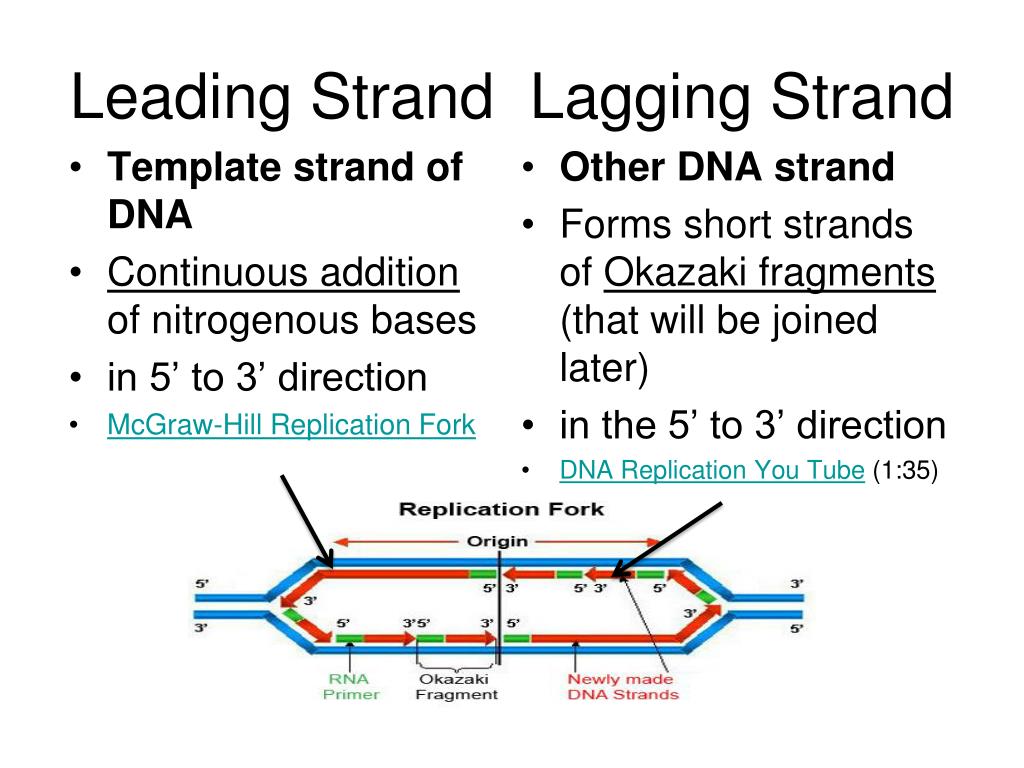Which Strand Is The Template Strand - The other strand is called the coding strand. (genetics) the noncoding strand of a dna molecule that is used as a template for rna synthesis. Transcription uses one of the two exposed dna strands as a template; Web position of the template and coding strands during transcription. This coding strand is likthe. Its counterpart, the antisense strand, guides the creation of a complementary rna strand during transcription. Web the template strand is the complimentary copy of the mrna in its nucleotide base pair sequence. The template strand acts as a base for mrna transcription. Web the sequence of the template strand is complementary to both the coding strand and the mrna. Web dna template strand and the creation of its complementary strand the primary enzyme involved in this is dna polymerase which joins nucleotides to synthesize the new complementary strand.

Difference between Sense Strand and Antisense Strand of DNA Dna
It contains complementary nucleotide sequences to the transcribed mrna. It is also known as. Learn about this topic in these articles: This strand is called the template strand. Web in transcription, an rna polymerase uses only one strand of dna, called the template strand, of a gene to catalyze synthesis of a complementary, antiparallel rna strand.

Difference Between Template and Coding Strand Definition
This strand is called the template strand. Web noun [ edit] template strand ( plural template strands ) ( genetics) the noncoding strand of a dna molecule that is used as a template for rna synthesis. Web each strand in the double helix acts as a template for synthesis of a new, complementary strand. It is also known as. Web.

Coding Versus Template Strand
Web position of the template and coding strands during transcription. Web noun [ edit] template strand ( plural template strands ) ( genetics) the noncoding strand of a dna molecule that is used as a template for rna synthesis. Transcription uses one of the two exposed dna strands as a template; It is also known as. The other strand is.

CIE A Level Biology复习笔记6.2.4 Transcription翰林国际教育
Web dna template strand and the creation of its complementary strand the primary enzyme involved in this is dna polymerase which joins nucleotides to synthesize the new complementary strand. Dna polymerase also proofreads each new dna strand to make sure. This coding strand is likthe. Web once transcription is initiated, the dna double helix unwinds and rna polymerase reads the.

Model of T7 DNA replication.The leadingstrand template (yellow) is
Web once transcription is initiated, the dna double helix unwinds and rna polymerase reads the template strand, adding nucleotides to the 3′ end of the growing chain (figure 2b). Web position of the template and coding strands during transcription. Web a template strand is the term that refers to the strand used by dna polymerase or rna polymerase to attach.

DNA Transcription Steps and Mechanism • Microbe Online
It is complementary to the. It is also known as. It contains complementary nucleotide sequences to the transcribed mrna. This coding strand is likthe. Web template strand which is also known as antisense strands runs in the direction of 3’ to 5’ ends, which runs opposite to the coding strands.

Dna Templating
Web each strand in the double helix acts as a template for synthesis of a new, complementary strand. Web position of the template and coding strands during transcription. Web noun [ edit] template strand ( plural template strands ) ( genetics) the noncoding strand of a dna molecule that is used as a template for rna synthesis. Kutevedzana kwerna kunoratidza.

PPT Chapter 11 Transcription PowerPoint Presentation, free download
Kutevedzana kwerna kunoratidza tambo yekukodha yedna,. It is also known as. New dna is made by enzymes called dna polymerases, which require a template and a primer (starter) and synthesize dna in the 5' to 3' direction. Dna polymerase also proofreads each new dna strand to make sure. Web a template strand is the term that refers to the strand.

Answered Template strand New strand New strand… bartleby
Web dna template strand and the creation of its complementary strand the primary enzyme involved in this is dna polymerase which joins nucleotides to synthesize the new complementary strand. The coding strand is referred to as the sense strand because it. It is also known as. Learn about this topic in these articles: The coding strand determines the correct nucleotide.

PPT DNA REPLICATION PowerPoint Presentation, free download ID1418059
The template strand acts as a base for mrna transcription. Web position of the template and coding strands during transcription. It is complementary to the. Transcription uses one of the two exposed dna strands as a template; Web the sequence of the template strand is complementary to both the coding strand and the mrna.
It is also known as. Dna polymerase also proofreads each new dna strand to make sure. The coding strand determines the correct nucleotide sequence of mrna. Web the sequence of the template strand is complementary to both the coding strand and the mrna. Web the template strand is the complimentary copy of the mrna in its nucleotide base pair sequence. Web in transcription, an rna polymerase uses only one strand of dna, called the template strand, of a gene to catalyze synthesis of a complementary, antiparallel rna strand. This strand is called the template strand. It contains complementary nucleotide sequences to the transcribed mrna. Web position of the template and coding strands during transcription. Kutevedzana kwerna kunoratidza tambo yekukodha yedna,. Often termed as the antisense strand or minus strand. Its counterpart, the antisense strand, guides the creation of a complementary rna strand during transcription. Web each strand in the double helix acts as a template for synthesis of a new, complementary strand. Web noun [ edit] template strand ( plural template strands ) ( genetics) the noncoding strand of a dna molecule that is used as a template for rna synthesis. (genetics) the noncoding strand of a dna molecule that is used as a template for rna synthesis. Transcription uses one of the two exposed dna strands as a template; Web once transcription is initiated, the dna double helix unwinds and rna polymerase reads the template strand, adding nucleotides to the 3′ end of the growing chain (figure 2b). The rna product is complementary to the template strand and is almost identical to the other dna strand, called the nontemplate (or coding ) strand. The template strand acts as a base for mrna transcription. The coding strand is referred to as the sense strand because it.